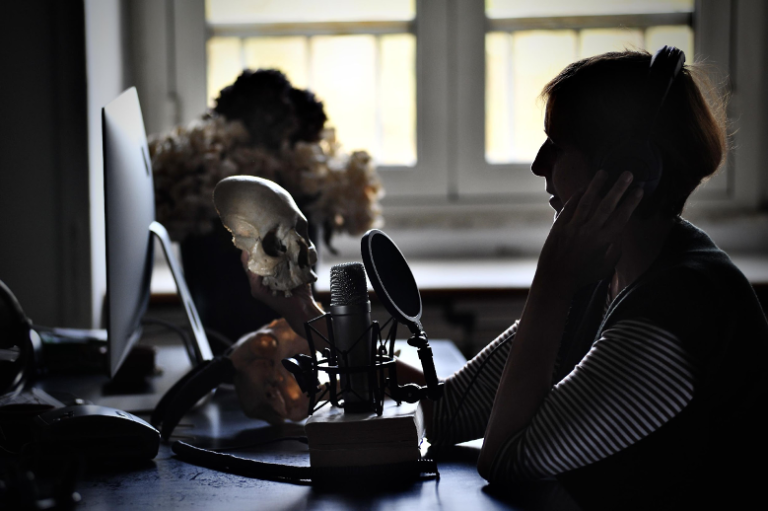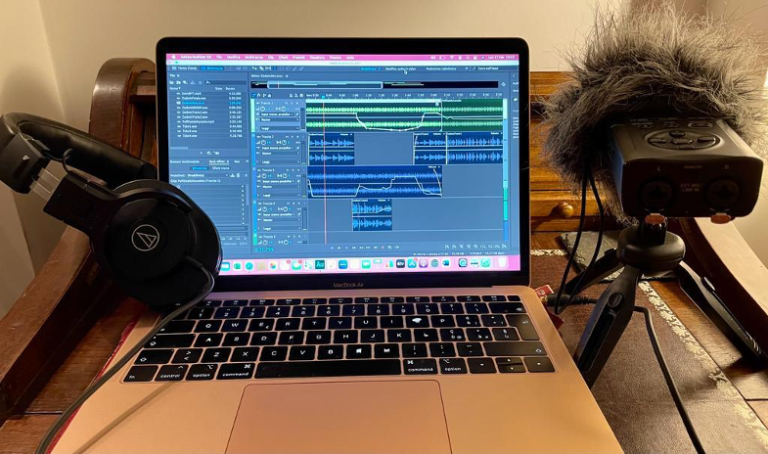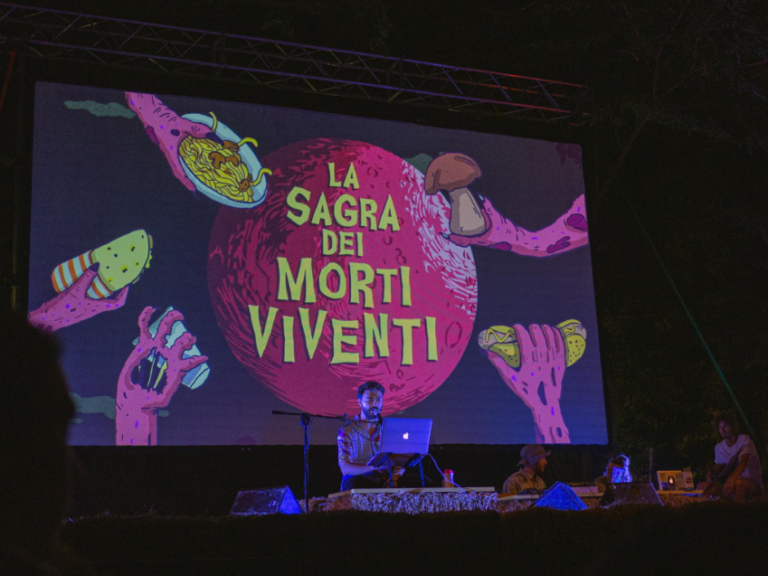Author: Federica Manzitti
In recent years, the podcast scene has exploded in most European countries. Praised for its intimate and personal approach, podcast is a medium of expression and experiment for many independent creatives. Is this new trend around podcasts going to threaten independent producers? How can the independent podcast scene be cherished and protected? Focus on the Italian podcast scene, its dynamics, evolutions, and players.
Anyone arriving at Rome’s Fiumicino airport these days will find themselves standing before a giant whale skeleton. It’s not evident from afar, but upon drawing closer, one perceives that around this sculpture by the designer, Marcantonio, there will be an “audioport”, a place to listen to and enjoy audio productions. This derives from an agreement between Aeroporti di Roma and Chora Media, an Italian podcast company founded in 2020. On the other hand, anyone who debarks at Milan’s central train station will find, on the stairs, in maxi format, advertising for Loud, the first social media app that claims to be based “on collaborative podcasting entirely Made in Italy”, launched in February 2023, by Alessandra Faustini, from Brescia.
That may be why “bubble” is the word most often associated with the world of podcasting today in Italy. In financial terms, a “bubble” is when the value of a sector grows exponentially and becomes ever more fragile until it bursts. Maybe the Italian “bubble” of podcasting won’t burst, but the state of euphoria surrounding the world of audio production is similar to the high after an evening sipping champagne. With lots of fizz.

Podcaster © Severine Queyras
Sticking with that metaphor, recent statistics suggest there’s good reason to drink up. The Ipsos Digital Audio Survey found there were 11.1 million listeners in Italy in 2022, a good 1.8 million more than the previous year, with the most substantial increase ever recorded since monitoring of this sector began in 2019. Other countries already experienced this phenomenon three or four years ago, or even more, as in the U.S. But here, in this country of mild weather, where Vitamin D is bestowed naturally, and where one can choose from 8,300 km of Mediterranean coast and 11.4 million hectares of forests, the habit of finding entertainment via a pair of headphones took root only during the lockdown imposed by the pandemic.
Nevertheless, the Italian ecosystem of audio production was already in existence. A straggling group of impassioned pioneers and obstinate researchers, those now known as independent audio producers, lived and thrived amid almost total indifference. It is thanks to them that we now have what is called podcasting, that is, the enormous opportunity to package content without the grids imposed by an editor (e.g., at a radio station), and to have it easily reach a potentially limitless audience of listeners. Those craftsmen of sound had few places to peddle their wares, which were initially called radio-phonic originals, audio stories or documentary radio. On RAI (the Italian national broadcasting network), minimal spaces were found for audio writing and creations that didn’t fit into the traditional slots. The liveliest one was Pinotto Fava’s Audiobox which, starting in the 1980’s, spurred on independent productions even when it ventured into linguistic extremes. Then came smallish spaces for audio documentaries: Cento Lire and its heir, Tre Soldi, which has been on the air since 2010. Outside the confines of “Mother RAI”, there was little more than Radio 24, a broadcaster linked to the financial newspaper Il Sole 24 ore, and Swiss Radio in Italian, abroad. A mouse of a world that has now become a pachyderm.
The lesson so often learned from capitalist enterprises has again come home to roost: big industry steps in where artisans lovingly planted the right seeds and wants to hog the whole pie. It is not yet clear that it will succeed in doing so. Other voices have gathered round the straggling group of artisans: the listening public has grown hundredfold and modest media companies are sprouting like mushrooms after rain.
For many independent audio producers, now is the time to reap the fruits of many years of hard labour, finally seeing the shekels roll in and a schedule bursting with consulting requests, engineering orders, financial proposals from name brands and government calls for bids nearing deadline. It’s a prosperous and heady season, both for the old guard and for those suddenly discovering podcasting as a vocation. In 2021, there were more than 25,000 podcasts in Italy, and that number is exploding. Major audio companies, such as Audible, Storytel, and Spotify, have set up shop in Italy, and others are flocking in. The major names in print news media have opened their own media factories, such as One Podcast at GEDI–publisher of the dailies Repubblica and La Stampa–which claimed 14 million in streaming per month in 2022, or Il Post, which is broadening the community around its audio products. RAI has set up a web site for digital listening, RAI Play Sound, with the goal of “becoming a leader in the production and distribution of original, totally audio content.” In the meantime, a few true independents, such as Radio Papesse, and its Lucia Festival, are expanding. All of these grand initiatives need producers. And that’s where the party comes in.

Home podcaster © Federica Manzitti
As at any party, however, there’s someone who is dancing but wondering if everything is as fun as is seems. “For an independent author, this is when a choice has to be made: whether to go for the money or work on a high-quality project,” said Jonathan Zenti, a twenty-something audio and podcast designer, a prize-winner in the U.S. with a Third Coast and the creator, among other things, of the felicitous series Problemi. “We have fought like lions for years to make audio popular, and never imagined that industry would come round to take advantage of it. I am thinking, for example, about design, and trying to come up with worthwhile content in an industrial context. I ask myself how to produce something that people will want to listen to ten or twenty years from now.” That topic is even discussed in an episode of his Problemi, an independent podcast that, in each edition, deals ironically but analytically with a subject that its author deems complex, ranging from how hard it is to say “no”, to how hard it is to find a parking space and, finally, with the difficulties of independent production.
Another producer in Italy who invented himself a new job is Carlo Annese, founder in 2016 of the Piano P Italian news podcast platform. He sees the “bubble” in a glass half full: “The number of listeners has grown, but there are few cases of dedicated listening because no one wants to hear something unappetising twice. If the first episode is not first rate, the audience goes elsewhere. Let’s take branded podcasts: In Italy, lots of companies went that route to say they’d done so, but without believing in it. Even the blog effect is wearing thin,” says Annese, “and in the news sector, there is little besides piece-meal reconstructions, with very few original investigations.”
“Patience” is the key word for Francesco Baschieri, CEO of Spreaker, a platform based in New York, with 4 million single listeners per month and a reach of 200 million, at the heart of which is his start-up that sprouted in Bologna in 2010. “Italy needs to learn the ropes, was the case in the U.S., and I estimate that it is about five years behind the curve, so there’s no big hurry. On our hosting app, during the pandemic, independent contents increased, and now we are getting advertisers and editors”, said Baschieri who, in March 2023, made subscriptions free for all creators. “It’s true that the business mindset in Europe is more conservative, but the consumer dynamics are comparable. High-quality productions will survive because the success of a podcast depends on one’s engagement, and thus on the niche, not on a mass market.”
Milan is surging ahead as the capital of Italian digital audio. This is patently evident to someone who, during the pandemic, left video production for audio work, such as Amedeo Berta, the creator of Strano Podcast and Pane e fantasmi: “We can see things really starting to happen here,” he says, “but I have no idea where they will end up.” This is also confirmed by those who have been in radio in Milan for decades, such as the producer, Fabrizia Brunati, co-author with Sara Zambrotti of A microfono spento, a handbook on radio broadcast producers’ careers in Italy: “We found in our research that, in Italy, there is no such thing as a set contract figure for a producer, not even in radio broadcasting.” Daria Corrias, in Rome, a writer for Tre Soldi, echoes that sentiment: “Our impression is that everybody is throwing themselves into podcasts but without really having their bearings. In this context, an independent audio producer can survive if crowd-funding (such as Patreon) takes root here. What’s missing is a long-term perspective and relevant training.”
Given that, there are those who got training elsewhere, but who use the medium with uninhibited talent. In 2020, Johnny Faina, the pseudonym of Nicolò Valandro, launched two podcasts, Decameron and C’è vita nel Grande Nulla Agricolo?, a radio drama with strong hints of surrealism where curiosities such as lost dogs, mysterious lights in the sky, a ghost car and many other unexplainable events in the hinterland of Romagna take on a legendary dimension. “We had started out in the theatre, and it was no accident that our first episode was live,” recounts Valandro, “and the project went round all of Italy with The Villamara Drive-in Tour. The feedback is really good, and some brands have shown up to jump on the bandwagon. They want to learn how to make money, but we are still UFO’s. We would obviously like to expand, but we have a truly unique product that doesn’t easily fit into the traditional moulds.”

Johnny Faina during a live of the VIllamara tour for the podcast C'èvita nel grande nulla agricolo? © Frederica Manzitti
Maintaining quality for success should be a natural tendency, but it’s not. Not in Italy. “For the time being,” says Faina, “we’re doing merchandising and making a go with live productions.” Italy’s situation, however, is not so unusual. In other European countries, the pluses and minuses are similar. This was discussed at the latest edition of MIRP in Leuven, Belgium, the meeting of audio creatives of which Zenti is one of the founders: “It's an international network of independent producers that was born in 2015. We met in June after the break imposed by the pandemic, but the feeling is that 25 years have gone swiftly by. Things in this sector have changed greatly. You even find competitiveness and envy. The audio industry on a local basis has picked up the creative spirits. What we now need is a perspicacious sense of observation.”
In the meantime, there are things emerging that can serve as an intermediate stage between producers and sponsors. Such is the case of Podmaker, a platform that promises to “create connections between brands and podcasters to produce high-value content.” Curiously, the company, founded in early 2023, operates out of Naples, farther south in the country, and well away from what’s happening in Milan.
Published on November 28th, 2023
About the author:
Federica Manzitti, journalist specialising in culture and entertainment, after working for many years in radio she now devotes herself to print media and, in parallel, to podcast production.